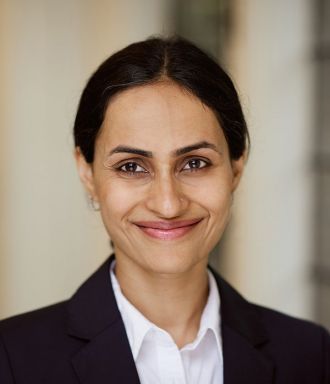Dr Radhika Khosla
About
Dr Radhika Khosla's work seeks to advance understanding of one of the most fundamental questions of our time: how can societies improve human well-being while preserving and enhancing the natural environment? Her interdisciplinary research examines the productive tensions between urban transitions, energy services consumption and climate change, with a focus on developing country cities.
Her research looks at two sets of interrelated questions. How does consumption of energy-related services change as cities urbanize? What are the socio-technical drivers, systems and institutional structures that shape energy and carbon emission pathways? And what forms of governance and political rationalities characterize the varied urban responses to climate change in rapidly developing cities, given their (often competing) objectives to provide urban services?
Dr Khosla also leads the Future of Cooling Programme at the Oxford Martin School, is the programme lead for zero-carbon energy use at Oxford’s ZERO Institute, is co-lead of Oxford Net Zero, and is a member of the UK Government’s UK-India Advisory Committee. Dr Khosla works closely at the interface of research and policy. She is Editor-in-Chief of the high-impact peer reviewed journal, Environmental Research Letters. She has been Special Scientific Advisor to the UK’s House of Commons Environment Audit Committee for the inquiry on heat resilience and sustainable cooling (2023-24). She serves on the UK Government’s Foreign Commonwealth and Development Office UK-India Advisory Board.
Dr Khosla has supported authorship of a number of international scientific reports and is lead author of the UNEP’s spotlight report on the first Global Cooling Watch (2023). She has also been an author of the UNEP Emissions Gap Report 2020 and the IPCC’s Sixth Assessment Report (2022).
In 2023, she received an Honourable Mention for the Bina Agarwal Prize in Ecological Economics for her work on energy consumption pathways. As Research Director of the Oxford India Centre for Sustainable Development, she helps bridge research and networks on India at Oxford and internationally and was recognized as one of the ‘most influential people’ in UK-India relations (2019).
Expertise
- Energy
- Energy consumption/demand
- Climate change
- Development
- Cities
- Urban transitions
- Cooling
- Extreme heat
- India
Selected publications
- Global Cooling Watch 2023
- Understanding systemic cooling poverty (2023)
- Change in cooling degree days with global mean temperature rise increasing from 1.5 °C to 2.0 °C (2023)
- Health risks of extreme heat (2021)
- The what, why, and how of changing cooling energy consumption in India's urban households (2021)
- Socially constructed or physiologically informed? Placing humans at the core of understanding cooling needs (2021)
- Cooling for Sustainable Development (2020)
- Advances Toward a Net-Zero Global Building Sector (2020)
- Successful clean energy technology transitions in emerging economies: learning from India, China, and Brazil (2020)
Recent media work
- COP28: countries have pledged to cut emissions from cooling – here’s how to make it happen (The Conversation, 2023)
- How to make homes cooler without cranking up the air conditioning (The Conversation, 2023)
- Northern Europe faces biggest relative increase in uncomfortable heat and is dangerously unprepared (The Conversation, 2023)
- UK net zero strategies are overlooking something vital: how to cool buildings amid rising temperatures (The Conversation, 2021)
- Scorching and surrounded by water, Singapore is on climate’s front lines (Financial Times, 2021)
- How energy demand for cooling in India’s cities is changing (Carbon Brief, 2021)
- What the world can learn from clean energy transitions in India, China and Brazil (The Conversation, 2020)
- Demand for cooling is blind spot for climate and sustainable development (Carbon Brief, 2020)
- How energy-efficient LED bulbs lit up India in just five years (Carbon Brief, 2020)
- Why India Has a Point at the Paris Climate Talks (Time, 2015)
